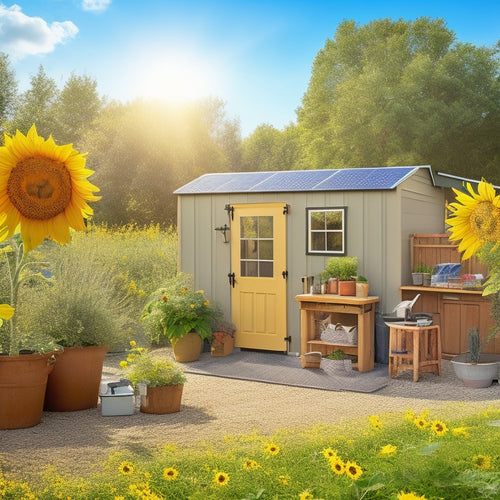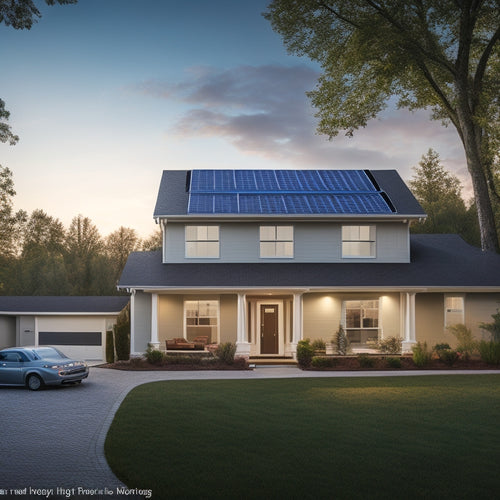
Home Solar Battery System
Share
You're considering a home solar battery system to reduce your reliance on the grid and minimize your environmental impact, while ensuring a steady electricity supply and enhancing your comfort and safety. With a solar battery system, you can store excess energy for nighttime use, reducing your reliance on the grid during nighttime or low sunlight periods. By shifting to solar power, you'll decrease your reliance on fossil fuels, contributing to lower greenhouse gas emissions and a significant reduction in carbon dioxide production. As you investigate this technology, you'll uncover the importance of deep cycle battery technology, inverter compatibility, and maintenance strategies to optimize your system's performance and lifespan.
The Essentials
- Home solar battery systems provide energy independence and reliability by storing excess energy for nighttime use, reducing reliance on the grid.
- Transitioning to solar power decreases reliance on fossil fuels, contributing to lower greenhouse gas emissions and a significant reduction in carbon dioxide production.
- High-performance batteries are essential for energy storage, with expected lifespans ranging from 10-15 years, influenced by quality and usage patterns.
- Regular monitoring and maintenance of battery performance, including cycle count and depth of discharge, can extend battery lifespan and optimize efficiency.
- Inverter compatibility and capacity must be considered, as it affects overall system efficiency and reliability, with lithium batteries offering higher efficiency and longer lifetimes.
Energy Independence at Night
You can power through darkness with a home solar battery system, which provides nighttime energy security by storing excess energy generated during the day.
By leveraging Renewable Energy Systems, you can maximize your energy independence and reduce your reliance on non-renewable energy sources.
This means you're not reliant on the grid when the sun goes down, and you can continue to use your appliances and lights without interruption.
With a fully charged battery, you'll have a reliable source of energy throughout the night, giving you peace of mind and independence from the grid.
Power Through Darkness
The ability to power through darkness is an essential aspect of achieving energy independence, as it guarantees a steady supply of electricity even when the sun isn't shining. You can't always rely on the sun to generate power, especially at night or during periods of low sunlight.
This is where battery storage comes in – it allows you to store excess energy generated during the day for nighttime usage. With a reliable electricity supply from Solar Power Backup, you can enjoy uninterrupted power supply even during outages.
Additionally, it reduces your reliance on noisy, polluting generators and the hassle of refueling them. With a home solar battery system, you can store energy in batteries during the day and use it to power your home at night.
This means you can enjoy the freedom of energy independence, even when the grid is down or the sun isn't shining. You'll have a steady supply of electricity to power your lights, appliances, and devices, giving you peace of mind and comfort in your own home.
Nighttime Energy Security
Switching to nighttime mode, your home solar battery system kicks in, providing energy independence when the grid is down or the sun isn't shining.
This is when your energy storage system takes center stage, supplying nighttime power to your home. By integrating a battery storage system into your solar setup, you'll reveal the full potential of renewable energy and create a more sustainable, dependable, and cost-effective power solution Solar Energy Storage Solutions.
With a fully charged battery, you can power essential appliances and lights, guaranteeing your family's comfort and safety.
During nighttime hours, your home solar battery system automatically detects when the grid is down and seamlessly switches to backup mode. This instantaneous response guarantees uninterrupted power supply, giving you peace of mind.
The advanced energy storage technology stores excess energy generated during the day, making it available for use when you need it most.
Reduced Carbon Footprint Guaranteed
You're switching to a cleaner, eco-friendly energy source with your home solar battery system, which considerably reduces your reliance on fossil fuels.
By utilizing solar power, you'll lower your emissions today and contribute less to greenhouse gases.
With residential solar energy systems, homeowners like you can take advantage of Renewable energy solutions that not only benefit the environment but also reduce energy bills.
This means you'll be producing considerably less carbon dioxide, making a positive impact on the environment.
Eco-Friendly Energy Source
Utilizing the power of the sun, a home solar battery system guarantees a reduced carbon footprint, providing a guilt-free energy solution for environmentally conscious homeowners.
You can capture solar energy to power your home, reducing your reliance on traditional fossil fuels and lowering your environmental impact. By embracing sustainable living, you're contributing to a cleaner, greener future.
With a home solar battery system, you're tapping into renewable resources, leveraging green technology to optimize energy efficiency.
This not only reduces your carbon footprint but also yields significant solar savings. By going off-grid, you're no longer beholden to fluctuating electricity costs, enjoying greater control over your energy usage.
Lower Emissions Today
Lower Emissions Today (Reduced Carbon Footprint Guaranteed)
Every kilowatt-hour of solar energy you employ reduces your reliance on fossil fuels, directly translating to a decrease in greenhouse gas emissions. By switching to a home solar battery system, you're contributing to a cleaner environment and reducing your carbon footprint. This sustainable solution leverages renewable resources, ensuring a significant decrease in emissions and dependence on non-renewable energy sources.
With a solar battery system, you're investing in green technology that provides long-term energy savings. You'll notice a reduction in your energy bills, and the environmental benefits will be substantial.
By choosing a home solar battery system, you're making a smart investment in your future and the planet's. You'll be reducing your carbon footprint, contributing to a cleaner environment, and promoting a sustainable future.
Join the movement towards a greener tomorrow by adopting a home solar battery system. This innovative solution is a significant step towards reducing emissions and creating a better environment for generations to come.
Deep Cycle Battery Technology
When you're considering a home solar battery system, you'll want to understand the deep cycle battery technology that powers it.
To maximize renewable energy storage and reduce reliance on the grid, it's crucial to choose high-performance batteries solar power system battery that can handle the demands of your home energy needs.
You'll expect a battery lifespan of around 10-15 years, with a cycle count performance metric that measures the number of charge/discharge cycles it can handle before capacity degrades.
Battery Lifespan Expectations
You can expect a deep cycle battery in your home solar battery system to last around 5-7 years, with some manufacturers claiming up to 10 years, depending on various factors.
The actual lifespan will hinge on factors like the quality of the battery, charging and discharging patterns, and environmental conditions. Proper battery maintenance tips, such as regular monitoring of state of charge, voltage, and temperature, can help extend the battery's lifespan.
Additionally, verifying the battery isn't deeply discharged or overcharged can also contribute to a longer lifespan.
When the time comes to replace your deep cycle battery, you'll have various battery replacement options to think about.
You may choose to replace the battery with a similar model or upgrade to a newer, more efficient technology. It's crucial to evaluate the costs and benefits of each option, taking into account factors like the initial investment, maintenance requirements, and overall performance.
Cycle Count Performance Metrics
Deep diving into the performance metrics of your deep cycle battery technology, you'll find that cycle count is a critical factor in determining its overall health and lifespan. This metric measures the number of charge and discharge cycles your battery can handle before its capacity starts to degrade. A higher cycle count indicates a more durable battery that can withstand repeated charging and discharging without losing its ability to store energy efficiently.
When evaluating your battery's performance metrics, it's crucial to take into account the cycle count in conjunction with other factors, such as depth of discharge (DOD) and round-trip efficiency. A battery with a high cycle count but low DOD may not be as effective in storing energy as one with a lower cycle count but higher DOD. By analyzing these metrics together, you can gain a thorough understanding of your battery's capabilities and make informed decisions about its maintenance and replacement.
As you monitor your battery's performance, keep in mind that the cycle count will decrease over time. Regular maintenance, such as balancing the cells and adjusting the charging profile, can help slow down this degradation and extend the lifespan of your deep cycle battery.
Check Your Inverter Compatibility
When selecting a home solar battery system, you'll need to make certain your inverter is compatible with your chosen battery type, as different inverters are optimized for specific battery chemistries, such as lithium-ion or lead-acid renewable energy solutions.
Additionally, consider the inverter's ability to integrate with other sustainable power sources, like off-grid solar systems.
You'll also need to check the inverter's capacity to handle the battery's charging and discharging capabilities.
Battery Type Matters
Most solar battery systems rely on a specific type of battery technology to store excess energy generated by the solar panels.
You'll want to evaluate the advantages of lithium batteries, which offer higher efficiency, longer lifetimes, and lower maintenance requirements compared to traditional lead acid batteries.
Lithium batteries also provide faster charging speeds and more flexible storage capacity options.
When selecting a battery, you should also evaluate safety features, such as thermal management systems that prevent overheating.
Additionally, cost considerations, including the upfront cost and warranty options, will impact your decision.
Lead acid batteries, on the other hand, are generally more affordable upfront but may require more maintenance and have lower storage capacities.
You should weigh these differences carefully to guarantee you choose the right battery type for your home solar battery system.
Inverter Capacity Check
Now that you've selected the right battery type for your home solar battery system, it's time to make sure your inverter is compatible with your chosen battery. The inverter plays a vital role in converting DC power from your solar panels to AC power for your home.
To guarantee a seamless integration, you need to check the inverter capacity. Inverter sizing is essential, as an undersized inverter can lead to reduced system efficiency and even damage to your equipment. Conversely, an oversized inverter can result in higher upfront costs and reduced inverter efficiency.
You need to determine the best inverter size that matches your battery's capacity and your energy requirements. Check your inverter's specifications to confirm it can handle the voltage and current output of your battery.
Also, consider the inverter's efficiency rating, as a higher efficiency inverter will result in less energy loss and more power available for your home. By verifying your inverter's compatibility with your battery, you'll secure a reliable and efficient home solar battery system that meets your energy needs.
Longer Cycle Life Guaranteed
You'll want a home solar battery system that can withstand the test of time, and that's exactly what you get with a longer cycle life guarantee.
This means your battery's durability is extended, ensuring it can handle the daily charge and discharge cycles without degrading prematurely.
With a longer cycle life, you can enjoy a more reliable and consistent energy supply from your solar panel system.
Extended Battery Durability
With a home solar battery system, your energy storage depends on the durability of its batteries, which is why manufacturers focus on extending their cycle life. You want to guarantee your batteries last as long as possible, and proper maintenance plays a vital role in achieving this.
Here is a summary of key factors influencing battery durability:
| Factor | Impact on Durability | Tips for Best Performance |
|---|---|---|
| Storage Temperature | High temperatures reduce lifespan | Store batteries between 60°F to 80°F (15°C to 27°C) |
| Depth of Discharge (DOD) | Avoiding deep discharging prolongs life | Limit DOD to 50% or less to minimize wear |
| Charging Cycles | Excessive cycling reduces lifespan | Monitor and adjust charging cycles accordingly |
| Maintenance Schedules | Regular checks prevent damage | Perform routine maintenance every 6 months |
Frequently Asked Questions
Can I Use My Existing Solar Panels With a New Battery System?
You can likely reuse your existing solar panels with a new battery system, but you'll need to guarantee battery compatibility and assess panel efficiency to optimize performance, as outdated panels might not be as efficient as newer ones.
How Long Does It Take to Install a Home Solar Battery System?
When you decide to upgrade, you're probably wondering how long the installation process will take. Typically, it'll take around 1-3 days, depending on the complexity and battery capacity, but you'll be enjoying your newfound energy independence in no time.
Are Home Solar Battery Systems Eligible for Government Incentives?
You're likely eligible for government incentives, such as tax credits, when investing in renewable energy solutions. Incentive programs are available for homeowners who adopt eco-friendly technologies, and you can claim these benefits when filing your taxes.
Can I Monitor My Energy Usage and Storage Remotely?
You can remotely monitor your energy usage and storage in real-time, enjoying the freedom to track your consumption and production patterns through energy monitoring platforms, accessing critical data from anywhere, at any time, with remote access.
Are Home Solar Battery Systems Prone to Overheating?
Just like a laptop in a hot car, batteries can overheat if not properly ventilated. You'll be relieved to know that reputable manufacturers design their systems with overheating causes in mind, prioritizing battery safety to guarantee your freedom from energy worries.
Final Thoughts
With a home solar battery system, you'll be unstoppable, utilizing the power of the sun to fuel your life 24/7! You'll slash your carbon footprint, enjoy energy independence at night, and reap the benefits of deep cycle battery technology. Plus, with longer cycle life guaranteed, you'll be saving money for years to come. Don't let energy bills drain your wallet - take control with a home solar battery system that'll give you the freedom to live life on your own terms.
Related Posts
-

Building an Emergency Backup Solar Power System in 5 Essential Steps
Building an emergency backup solar power system involves five key steps. First, assess your daily energy needs to ide...
-

Cost of Solar With Battery Backup
You're investing in a solar panel system with battery backup to guarantee reliable power during outages. The cost of ...
-

Off Grid Solar Batteries
As you shift to off-grid living, you'll rely on high-performance solar batteries to store excess energy generated by ...


